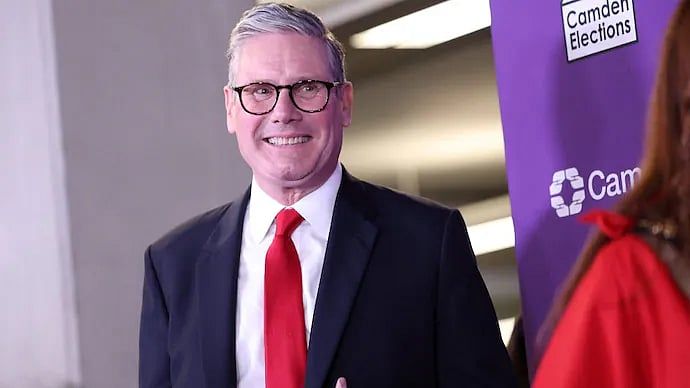
London: Keir Starmer on Monday became the first British Prime Minister to join European Union (EU) leaders at an informal meeting of the European Council in Brussels since Brexit, with defence and security talks at the heart of their agenda.
The meeting with leaders of the 27 member-states of the economic bloc, which the UK had voted to exit in a June 2016 referendum, comes against the backdrop of US President Donald Trump’s tariff threats triggering trade wars with economies around the world.
The Brussels visit is part of what the Starmer-led Labour government calls a post-Brexit "reset" between the UK and the EU.
"We need to see all allies stepping up – particularly in Europe. President Trump has threatened more sanctions on Russia and it's clear that's got Putin rattled. We know that he’s worried about the state of the Russian economy," said Starmer.
“I’m here to work with our European partners on keeping up the pressure, targeting the energy revenues and the companies supplying his missile factories to crush Putin’s war machine. Because ultimately, alongside our military support, that is what will bring peace closer,” he said.
According to 10 Downing Street, Starmer will call on Europe to keep up the pressure on Russia, alongside sustained military support to Ukraine, to put them in the strongest possible position this year.
Addressing a joint press conference with North Atlantic Treaty Organisation (NATO) Secretary General Mark Rutte, the British prime minister stressed that Britain won't choose between the US and the EU.
"I've always been clear that both are important to us. We are not choosing between them, but that's historically been the position of the UK for many, many decades now," he stated, in response to a question about keeping Trump on side.
"It's in the best interests in the UK and global security that we work with the EU and the US," added Starmer.
At the EU Council meeting later on Monday, Starmer is expected to set out his pitch for an “ambitious UK-EU defence and security partnership”, with a number of steps to increase cooperation on shared threats and go further on cross-border crime and illegal migration, while delivering growth and security for Britain.
The session of the Informal European Council, at the historic Palais d'Egmont in the Belgian capital, is being presented as part of the UK’s commitment to strengthen its partnership with the EU in order to drive growth, boost living standards and keep the UK safe and secure.
"The Prime Minister is committed to making Brexit work better for the British people while keeping within his red lines – no return to freedom of movement and no re-joining the customs union or single market,” Downing Street said.
Among the subjects on the table include allowing food and animal products to be traded more freely, cooperation on energy with a possible tie-up between the UK and the EU's emission trading schemes, mutual recognition of professional qualifications and allowing touring musicians to travel more easily are also themes of interest.
The Opposition Conservative Party leader, Kemi Badenoch, has warned that the Labour government is trying to “reopen the divisions of the past and edge us back into the EU".
(Except for the headline, this article has not been edited by FPJ's editorial team and is auto-generated from an agency feed.)